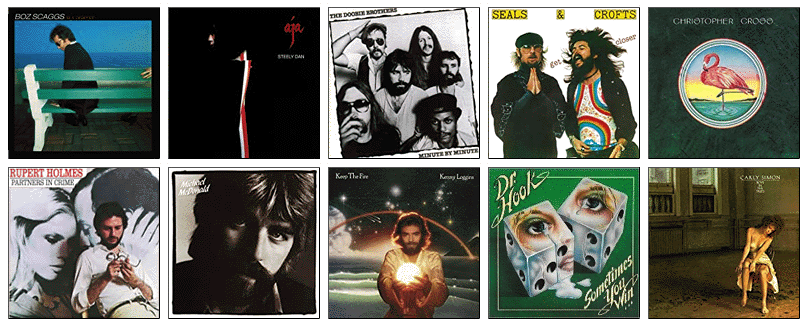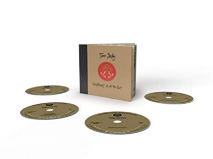![]()
| Yacht Rock 101 |
|
![]()

The smooth Seventies sound that's enjoyed a sweet second life.
By David Browne in Rolling Stone
![]() uring the late Seventies and early Eighties, the radio was dominated by silver-tongued white-dude crooners with names like Rupert and Gerry, emoting over balmy R&B beats, swaying saxes, and dishwasher-clean arrangements. Though it didn't have a name, the genre -- soft rock you could dance to -- was dismissed by serious rock fans as fluffy and lame. But thanks to a web series in the mid-2000s, the style -- belatedly named "yacht rock" -- has since spawned a satellite-radio channel, tribute bands, and a Weezer cover of Toto's "Africa." Is the modern love of the music ironic or sincere? Hard to say, yet there's no denying yacht rock is a legit sound with a vibe all its own that produced a surprising amount of great, summer-friendly music.
uring the late Seventies and early Eighties, the radio was dominated by silver-tongued white-dude crooners with names like Rupert and Gerry, emoting over balmy R&B beats, swaying saxes, and dishwasher-clean arrangements. Though it didn't have a name, the genre -- soft rock you could dance to -- was dismissed by serious rock fans as fluffy and lame. But thanks to a web series in the mid-2000s, the style -- belatedly named "yacht rock" -- has since spawned a satellite-radio channel, tribute bands, and a Weezer cover of Toto's "Africa." Is the modern love of the music ironic or sincere? Hard to say, yet there's no denying yacht rock is a legit sound with a vibe all its own that produced a surprising amount of great, summer-friendly music.
Must-Haves
 Boz Scaggs - Silk Degrees 1976 Before yacht rock was an identifiable genre, Scaggs (no fan of the term, as he told Rolling Stone in 2018) set the standard for what was to come: sharp-dressed white soul, burnished ballads that evoked wine with a quiet dinner, and splashes of Me Decade decadence (the narrator of "Lido Shuffle" is setting up one more score before leaving the country). With the Philly Soul homage "What Can I Say" and the lush sway of "Georgia," Silk Degrees set a new high bar for Seventies smoothness.
Boz Scaggs - Silk Degrees 1976 Before yacht rock was an identifiable genre, Scaggs (no fan of the term, as he told Rolling Stone in 2018) set the standard for what was to come: sharp-dressed white soul, burnished ballads that evoked wine with a quiet dinner, and splashes of Me Decade decadence (the narrator of "Lido Shuffle" is setting up one more score before leaving the country). With the Philly Soul homage "What Can I Say" and the lush sway of "Georgia," Silk Degrees set a new high bar for Seventies smoothness.
Steely Dan - Aja 1977 The sophisticated high-water mark of yacht, Donald Fagen and Walter Becker's masterpiece is the midway point between jazz and pop, with tricky tempo shifts, interlocking horn and keyboard parts, and pristine solos. Not settling for easygoing period clichés, these love songs, so to speak, are populated by a sleazy movie director (the gorgeous rush of "Peg"), a loser who still hopes to be a jazzman even if the odds are against him (the heart-tugging "Deacon Blues"), and a guy whose nodding-out girlfriend is probably a junkie ("Black Cow"). The most subversive cruise you'll ever take.
The Doobie Brothers - Minute by Minute 1978 The Doobies got their start as a biker-y boogie band, but they smoothed things out for Minute by Minute. Highlighted by "What a Fool Believes," the unstoppable Michael McDonald-Kenny Loggins co-write, the LP piles on romantic turmoil, falsetto harmonies, and plenty of spongy electric piano. But it also proves how much personality and muscle the Doobies could bring to what could be a generic sound. McDonald's husky, sensitive-guy delivery shrouds the unexpected bitter title song, and honoring their biker roots, "Don't Stop to Watch the Wheels" is about taking a lady friend for a ride on your motorcycle.
Further Listening
Seals and Crofts - Get Closer 1976 The hit title track validated the idea that folky singer-songwriters could tap into their R&B side and cross over in ways they never imagined -- making it the Dylan-goes-electric moment of yacht. Get Closer has plenty of other pleasures. In "Goodbye Old Buddies," the narrator informs his pals that he can't hang out anymore now that he's met "a certain young lady," but in the next song, "Baby Blue," another woman is told, "There's an old friend in me/ Tellin' me I gotta be free." A good captain follows the tide where it takes him.
 Christopher Cross - Christopher Cross 1979 Cross' debut swept the 1981 Grammys for a reason: it's that rare yacht-rock album that's graceful, earnest, and utterly lacking in smarm. The Lite FM staple "Sailing" is a powered-down ballad, and with its rousing Michael McDonald cameo, "Ride Like the Wind sneaks in raw outlaw lyrics ("Lived nine lives/ Gunned down 10") into a breezy groove, perfecting the short-lived gangster-yacht subgenre.
Christopher Cross - Christopher Cross 1979 Cross' debut swept the 1981 Grammys for a reason: it's that rare yacht-rock album that's graceful, earnest, and utterly lacking in smarm. The Lite FM staple "Sailing" is a powered-down ballad, and with its rousing Michael McDonald cameo, "Ride Like the Wind sneaks in raw outlaw lyrics ("Lived nine lives/ Gunned down 10") into a breezy groove, perfecting the short-lived gangster-yacht subgenre.
Rupert Holmes - Partners in Crime 1979 The album that made Holmes a soft-rock star is known for "Escape (The Piña Colada Song)," which sports a made-for-karaoke chorus and a plot twist worthy of a wide-collar O. Henry. But what distinguishes the album is the Steely Dan-level musicianship and Holmes' ambitious story songs, each sung with Manilow-esque exuberance -- like "Answering Machine," in which a conflicted couple trades messages while continually being cut off by those then state-of-the-art devices.
Going Deeper
Michael McDonald - If That's What It Takes 1982 Imagine a Doobie Brothers album entirely comprised of McDonald songs and shorn of pesky guitar solos or Patrick Simmons rockers, and you have a sense of McDonald's first and best post-Doobs album. If That's What It Takes builds on the approach of "What a Fool Believes" but amps up the sullen-R&B side of his music. The brooding remake of Lieber and Stoller's "I Keep Forgettin'" is peak Mac.
 Kenny Loggins - Keep the Fire 1979 Loggins' journey from granola folk rocker to pleasure-boat captain embodies the way rock grew more polished as the Seventies wore on. Anchored by the percolating-coffeemaker rhythms and modestly aggro delivery of "This Is It," another McDonald collaboration, Keep the Fire sets Loggins' feathery voice to smooth-jazz saxes and R&B beats. The secret highlight is "Will It Last," one of the sneakiest yacht tracks ever, fading to a finish after four minutes, then revving back up with some sweet George Harrison-style slide guitar.
Kenny Loggins - Keep the Fire 1979 Loggins' journey from granola folk rocker to pleasure-boat captain embodies the way rock grew more polished as the Seventies wore on. Anchored by the percolating-coffeemaker rhythms and modestly aggro delivery of "This Is It," another McDonald collaboration, Keep the Fire sets Loggins' feathery voice to smooth-jazz saxes and R&B beats. The secret highlight is "Will It Last," one of the sneakiest yacht tracks ever, fading to a finish after four minutes, then revving back up with some sweet George Harrison-style slide guitar.
Dr. Hook - Sometimes You Win 1979 These jokesters established themselves with novelty hits like "The Cover of the 'Rolling Stone,'" but they soon paddled their way toward unabashed disco yacht. Sometimes You Win features three of their oiliest earthworms: "Sexy Eyes," "When You're in Love With a Beautiful Woman," and "Better Love Next Time," all oozing the vibe of suburban pickup bars and the desperate dudes who hang out in them.
Carly Simon - Boys in the Trees 1978 As a trailblazing female singer-songwriter, Simon was already a star by the time yacht launched. Boys in the Trees features her beguiling contribution to the genre, "You Belong to Me," a collaboration with the ubiquitous Michael McDonald, as well as a yacht-soul cover of James Taylor's "One Man Woman" and a "lullaby for a wide-eyed guy" called "Tranquillo (Melt My Heart)." It's proof that men didn't have a stranglehold on the style.
Anchors Away - More smooth hits for your next high-seas adventure
"BREEZIN'" - George Benson, 1976 The guitarist and Jehovah's Witness made the leap from midlevel jazz act to crossover pop star with a windswept instrumental hit that conveys the yacht spirit as much as any vocal performance.
"WHATCHA GONNA DO" - Pablo Cruise, 1976 Carefree bounce from a San Francisco band with the best name ever for a soft-rock act -- named, fittingly, after a chill Colorado buddy.
 "BAKER STREET" - Gerry Rafferty, 1978 Rafferty brought a deep sense of lonely-walk-by-the-bay meloncholy to this epic retelling of a night on the town, in which Raphael Ravenscroft's immortal sax awakens Rafferty from his morning-after hangover.
"BAKER STREET" - Gerry Rafferty, 1978 Rafferty brought a deep sense of lonely-walk-by-the-bay meloncholy to this epic retelling of a night on the town, in which Raphael Ravenscroft's immortal sax awakens Rafferty from his morning-after hangover.
"REMINISCING" - Little River Band, 1978 The Aussie soft rockers delivered a slurpy valentine sung in the voice of an old man looking back on his "lifetime plan" with his wife. Innovative twist: flugelhorn solo instead of sax.
"WHENEVER I CALL YOU FRIEND" - Kenny Loggins and Stevie Nicks, 1978 This rare genre duet grows friskier with each verse, with both Loggins and Nicks getting more audibly caught up in the groover -- and the idea of "sweet love showing us a heavenly light."
"LOTTA LOVE" - Nicolette Larson, 1978 Neil Young's sad-boy shuffle is transformed into a luscious slice of lounge pop by the late Larson. Adding an extra layer of poignancy, she was in a relationship with Young around that time.
 "STEAL AWAY" - Robbie Dupree, 1980 Is it real, or is it McDonald? Acutally, it's the best Doobies knock-off -- a rinky-dink (but ingratiating) distant cousin to "What a Fool Believes" that almost inspired McDonald to take legal action.
"STEAL AWAY" - Robbie Dupree, 1980 Is it real, or is it McDonald? Acutally, it's the best Doobies knock-off -- a rinky-dink (but ingratiating) distant cousin to "What a Fool Believes" that almost inspired McDonald to take legal action.
"TAKE IT EASY" - Archie James Cavanaugh, 1980 Cult rarity by the late Alaskan singer-songwriter that crams in everything you'd want in a yacht song: disco-leaning bass, smooth-jazz guitar, sax, and a lyric that lives up to its title even more than the same-titled Eagles song.
"BIGGEST PART OF ME" - Ambrosia, 1980 Ditching the prog-classical leanings of earlier albums, this trio headed straight for the middle of the waterway with this Doobies-lite smash. Bonus points for lyrics that reference a "lazy river."
"I CAN'T GO FOR THAT (NO CAN DO)" - Daryl Hall and John Oates, 1981 The once unstoppable blue-eyed soul duo were never pure yacht, but the easy-rolling beats and shiny sax in this Number One hit got close. Hall adds sexual tension by never specifyng exactly what he can't go for.
 "COOL NIGHT" - Paul Davis, 1981 The Mississippi crooner-songwriter gives a master class on how to heat up a stalled romance: Pick a brisk evening, invite a female acquaintance over, and suggest... lighting a fire.
"COOL NIGHT" - Paul Davis, 1981 The Mississippi crooner-songwriter gives a master class on how to heat up a stalled romance: Pick a brisk evening, invite a female acquaintance over, and suggest... lighting a fire.
"KEY LARGO" - Bertie Higgins, 1981 Yacht's very own novelty hit is corny but deserves props for quoting from not one but two Humphrey Bogart films (Key Largo and Casablanca).
"AFRICA" - Toto, 1982 The same year that members of Toto did session work on Michael Jackson's Thriller, they released the Mount Kilimanjaro of late-yacht hits.
"SOUTHERN CROSS" - Crosby, Stills, and Nash, 1982 The combustible trio's gusty contribution to the genre has choppy-water rhythms and enough nautical terminology for a sailing manual.

By Greg Prato Until Michael McDonald writes a memoir, The Yacht Rock Book is the closest thing to a yacht history. There's interesting arcana such as what inspired Kenny Loggins' Keep the Fire LP cover and how Rupert Holmes wrote "The Piña Colada Song" -- plus, there's an intro by comedian Fred Armisen, who cleverly compares the genre to punk rock. |

| Tom Petty In The Wild, Again |
|
![]()
Three years after his death, a sprawling deluxe set of Petty's 1994 solo masterpiece finally arrives.
By Madison Vain in Esquire
Tom Petty
Wildflowers & All The Rest
ROCK (Warner Bros.)


![]() n 1994, at the age of 44, Tom Petty debuted his finest collection. Wildflowers is the diary of a man who, as he sings on "To Find a Friend," "in the middle of his life/ He left his wife/ And ran off to be bad" -- but it's not what he intended to release.
n 1994, at the age of 44, Tom Petty debuted his finest collection. Wildflowers is the diary of a man who, as he sings on "To Find a Friend," "in the middle of his life/ He left his wife/ And ran off to be bad" -- but it's not what he intended to release.
In the early stages of a divorce and a heroin addiction, Petty spent two years with producer Rick Rubin. The songs, which feel like unhurried batches of self-dialogue, just kept coming. Yet Warner Bros. Records deemed it criminally long. Forced to trim, Petty passed off outtakes to director Ed Burns for the soundtrack to She's the One, but much to his chagrin, when the movie was delayed, the record was marketed as new Tom Petty. "I was so depressed," he told his biographer, Warren Zanes.
In 2017, he spoke about releasing his initial vision; unfortunately, as we know now, he would run out of time. In October, three years after his death, it finally arrives. The sprawling deluxe sets include the ten tracks left off the original LP, plus never-before-released home demos and recordings from Heartbreakers shows. It's a triumph we can only hope Petty enjoys from behind the shimmery screen.
Three years after his death, one of Tom Petty's most pivotal albums
gets the respect -- and the reissue -- it so richly deserves.
By Sarah Rodman in Entertainment Weekly
 "So many songs, such a fun adventure." That's how Rick Rubin describes working on Tom Petty's masterful 1994 album Wildflowers in the liner notes to this lovingly curated expansion set, offered in multiple iterations.
"So many songs, such a fun adventure." That's how Rick Rubin describes working on Tom Petty's masterful 1994 album Wildflowers in the liner notes to this lovingly curated expansion set, offered in multiple iterations.
While the bearded Buddha of production zen may be referring to the whole experience, his joyful statement could also apply solely to Petty's second solo album. (Although this feels increasingly nominal in hindsight, as all but one track features members of his legendary Heartbreakers -- just drummer Steve Ferrone wasn't official yet.) A mix of acoustic pop dreams and garage rock burners, the album is one of the most expansive from the Florida-spawned, California-dreaming rocker. The hits -- the careeningly urgent "You Wreck Me," the stoner melancholia with a twist of wry "You Don't Know How It Feels," the winsome title track -- tell just part of the tale. Petty originally envisioned a double album. This set restores that concept, and goes beyond to a higher place.
The four-disc version includes the original album; one disc compromising the songs left behind (a full album nearly as good as what was released!); a compilation disc of early drafts; and a final CD re-creating most of the tracklist from various live performances.
Illuminating the music are gorgeous liner notes by David Fricke and an extensive track-by-track breakdown from Petty co-conspirators Benmont Tench, Mike Campbell, Ferrone, Rubin, and several engineers. Suffused with warmth and memory, this set belongs among your Tom Petty records. ![]()
![]() Reader's Comments
Reader's Comments
No comments so far, be the first to comment.
